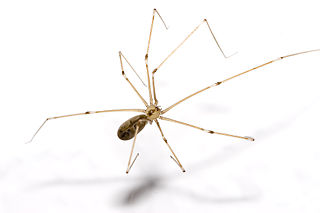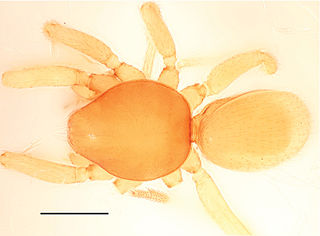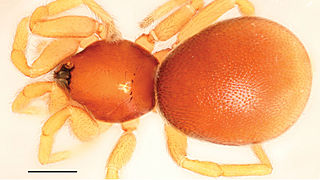
Oonopidae, also known as goblin spiders, is a family of spiders consisting of over 1,600 described species in about 113 genera worldwide, with total species diversity estimated at 2000 to 2500 species. The type genus of the family is OonopsKeyserling, 1835.

Epeus is a genus of the spider family Salticidae. They are often found on broad-leaved plants or shrubs of rain forest, or in gardens of Southeast Asia.

Tetrablemma is a widespread genus of armored spiders first described by Octavius Pickard-Cambridge in 1873. It only has four eyes; an unusual trait for spiders, found only here and in some species of Caponiidae, though the two are not closely related. The eyes are large, but unequal in size, closely grouped around the center of the prosoma that rises in a somewhat of a cone shape from the abdomen. They have four closely positioned spinnerets enclosed in a corneous casing.

Pholcus is a genus of spiders in the family Pholcidae, with 375 described species as of January 2023.

Ischnothyreus is a genus of oonopid spiders generally between 1.25 and 2.25 mm long. They have six eyes; in at least the species I. peltifer and I. omus, the males have a curious knob or hook at the base of the fang.

Macrothele is a genus of mygalomorph spiders in the family Macrothelidae, and was first described by A. Ausserer in 1871. Most species occur in Asia, from India to Japan, and Java, with five found in Africa, and two in Europe. The name is derived from Ancient Greek μακρός ("makro-"), meaning "big", and θηλή ("thele"), referring to the spinnerets.

The Artoriinae are a subfamily of wolf spiders. The monophyly of the subfamily has been confirmed in a molecular phylogenetic study, although the relationships among the subfamilies was shown to be less certain.

Bannana is a genus of goblin spiders native to Xishuangbanna prefecture, Yunnan Province, China, where it lives in the leaf-litter of tropical rainforest. There are two known species: Bannana crassispina and B. parvula, both described in 2015. Individuals are pale yellow and unpatterned, and range from around 1.0 to 1.8 mm in body length, with females being slightly larger than males. The eyes are reduced or entirely absent. Known only from a nature reserve in Xishuangbanna, Bannana belongs to a group of Asian goblin spiders known as the "Dysderoides complex", that ranges from China to Pakistan and south to Indonesia.
Psechrus is a genus of cribellate araneomorph spiders in the family Psechridae, and was first described by Tamerlan Thorell in 1878.

Belisana is a genus of cellar spiders that was first described by Tamerlan Thorell in 1898.
Gamasomorpha is a genus of goblin spiders in the family Oonopidae, containing sixty three accepted species.

Xestaspis is a genus of goblin spiders that was first described by Eugène Louis Simon in 1884.
Birabenella is a genus of spiders in the family Oonopidae. It was first described in 2010 by Grismado.
Pelicinus is a genus of spiders in the family Oonopidae. It was first described in 1892 by Simon. As of 2022, it contains 21 species.

Xyphinus is a genus of goblin spiders that was first described by Eugène Louis Simon in 1893.
Khorata is a genus of Asian cellar spiders that was first described by B. A. Huber in 2005.
Storenomorpha is a genus of spiders in the family Zodariidae. It was first described in 1884 by Simon. As of 2021, it contains 17 species, all from Asia.
Shuqiang Li is a Chinese arachnologist and a professor at the Institute of Zoology of the Chinese Academy of Sciences. Li is best known for his work with spiders and has described hundreds of new species and many genera. He is Editor in Chief of the journal Zoological Systematics.










